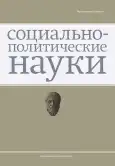Invention of Traditions of the Republic of Kazakhstan in the Aspect of Ethnic Identity
- Autores: Kabaziyev M.S.1
-
Afiliações:
- Ural Federal University named after B.N. Yeltsin
- Edição: Volume 13, Nº 1 (2023)
- Páginas: 52-57
- Seção: Political Institutions, Processes and Technologies
- URL: https://journals.eco-vector.com/2223-0092/article/view/545867
- DOI: https://doi.org/10.33693/2223-0092-2023-13-1-52-57
- ID: 545867
Citar
Texto integral
Resumo
The article analyzes the reasons for the invention of new traditions during the formation of independent Kazakhstan. The author relied on a constructivist approach in the study of ethnic processes. The theory of constructivism assumes that the ethnos is an artificial formation, the result of the creation and activity of the people themselves. The author has established the relationship between the mythologization of history, the invention of traditions and the creation of a national state. Different interpretations of common historical events lead to the birth of historical myths, which later turn into “memory wars” between nations. The invented traditions are used in solving collective tasks. The author comes to the conclusion that traditional institutions, which are the legacy of past eras, play a significant role in the life of modern Kazakhstan. Often, many open “Kazakh” traditions are relatively new, at least in the form in which they were introduced after independence, which is why we are talking about “invented traditions”. Mythologized history educates citizens as heirs of a great and strong nation. Invented traditions also contribute to strengthening these views. Ethnicity drives people’s actions and gives them a sense of life. Belief in a long common history strengthens and legitimizes ethnic ties of Kazakhs. The invented traditions are used in solving collective tasks.
Palavras-chave
Texto integral
Sobre autores
Manarbek Kabaziyev
Ural Federal University named after B.N. Yeltsin
Autor responsável pela correspondência
Email: kabaziyev@mail.ru
ORCID ID: 0000-0002-2285-3421
seeking the academic degree of Candidate of Sciences
Rússia, YekaterinburgBibliografia
- Galiev A.A. Invented traditions in the context of mythologized history. Electronic Scientific Journal “edu.e-history.kz”. 2018. № 3 (15). (In Rus.) URL: https://edu.e-history.kz/ru/publications/view/953
- Daniyarov K. Alternative history of Kazakhstan: Once again about Genghis Khan. Economic Strategies – Central Asia. 2007. No. 1. Pp. 40–45. (In Rus.)
- Jalilov Z.G. The revival of Islam in the context of the new realities of Kazakhstan. The World of the Big Altai. 2016. No. 2 (1.1). Pp. 23–32. (In Rus.)
- Drobizheva L.M. Ethnic identity of Russian in modern conditions: Ideology and practice. Soviet Ethnography. 1991. No. 1. 376 p. (In Rus.)
- Kagazbayeva E.M. Politicized versions of the past (on the example of the Turkish-Armenian conflict). Bulletin of Abaya KazNPU. Series: Sociological and Political Sciences. 2018. No. 3 (63). Pp. 21–27. (In Rus.)
- Kerimov A.A., Shutaleva A.V. Islam in the political process. In: Pivovarov readings. Synthetic paradigm: Science, philosophy, religious studies. A collection of conference materials. Yekaterinburg: Business Book, 2019. Pp. 213–215.
- Kerimov A.A., Kabaziev M.S. The ethnic component of the political identity of modern Kazakhstan. Bulletin of the Voronezh State University. Series: History. Political Science. Sociology. 2022. No. 4. Pp. 42–45. (In Rus.)
- Koreyanko V. Ethnonationalism, quasi-historiography and academic science. Reality of Ethnic Myths. 2000. Issue 3. 258 p. (In Rus.)
- Masanov N.E., Abylkhozhin Zh.B., Erofeeva I.V. Scientific knowledge and myth-making in modern historiography of Kazakhstan. Almaty: Dyke-Press. 2007. 296 p.
- Nurtazina N.D. Islam in the history of Kazhastan: New approaches and results of studying the problem for the 30th anniversary of independence (1991–2021). Bulletin of KazNU: History Series. 2021. No. 3 (102). Pp. 3–11. (In Rus.)
- Omarov E. Kazakhstan – heir to the empire of the Huns. Bulletin of the University “Kainar”. 1997. No. 2. Pp. 32–36. (In Rus.)
- Satbaev D. Geopolitics brings a strong split in our society. URL: https://camonitor.kz/27550-dosym-satpaev-geopolitika- vnosit-silnyy-raskol-v-nashe-obschestvo.html
- Soldatova G.U. Interethnic Psychology of tension. Moscow: Sense, 1998. 389 p.
- Stevanenko T.G. Ethnopsychology. Moscow: Academic Project, 1999. 320 p.
- Satpayev D. The goal of the elite is not to lose access to the resources of the “Electronic resource. URL: https:// www.ratel.kz
- Schnirelman V. National symbols, ethnohistorical myths and ethnopolitics. Theoretical Problems of Historical Research. 1999. Issue 2. 654 p. (In Rus.)
- Sultangalieva A. Revising the role of “religious revival” in Kazakhstan. Kazakhstan in Global Processes. 2014. No. 2 (40). Pp. 10–26. (In Rus.)
- Thompson P. Voice of the past. Oral history. Moscow: Higher School, 1989. 116 p.
- Hobsbaum E. Nations and nationalism after 1780. St. Petersburg: Aleteya, 1998. 306 p.
- Hosking J. Russia: the People and the Empire (1552–1917). Smolensk: Rusich, 2000. 512 p.
- Shnirelman V. Struggle for past: Ethnogenetic studies and рolitics in the USSR. 13th International Congress of Anthropological and Ethnological Sciences. Mexico City, 1993. 420 р.
- The Invention of Tradition. E. Hobsbawm, T. Ranger (eds.). Cambridge, 1983. 320 p.
Arquivos suplementares











